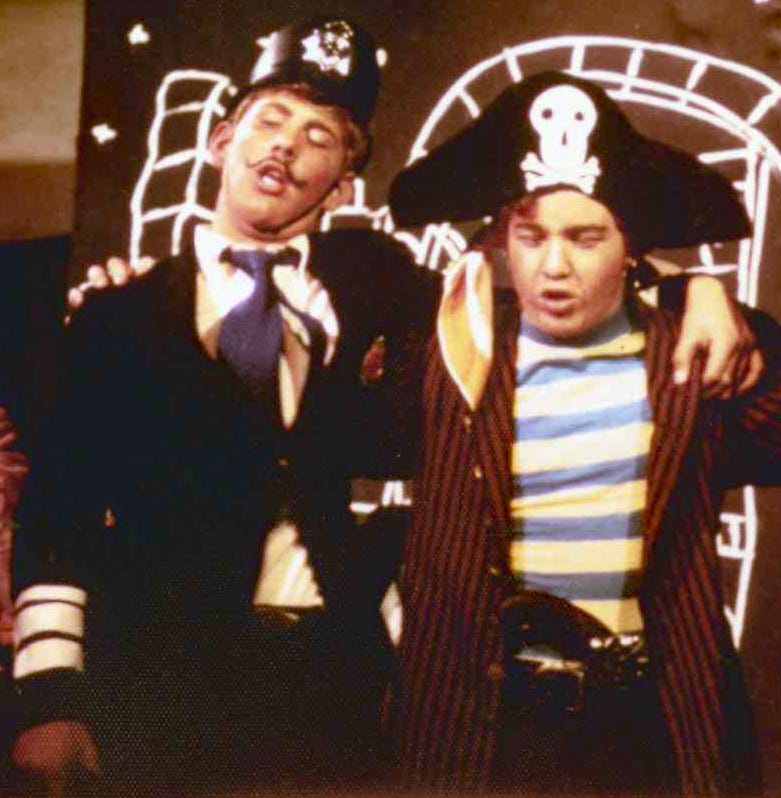Hurrah for the Pirate King!
And Hurrah to the Gilbert & Sullivan Society of Houston, Texas (USA)
Gilbert & Sullivan (or G&S as we who love them say) wrote “light opera.” “Light-hearted,” but not “light weight.”
I am the very model of a modern Major-General, I've information vegetable, animal, and mineral, I know the kings of England, and I quote the fights historical From Marathon to Waterloo, in order categorical; I'm very well acquainted, too, with matters mathematical, I understand equations, both the simple and quadratical, About binomial theorem I'm teeming with a lot o' news, With many cheerful facts about the square of the hypotenuse.
– From The Pirates of Penzance (1879)
Listen to Gilbert's masterful word-play, set to Sullivan's elegant, jaunty and engaging score. (The singer is John Reed of the D'Oyly Carte Opera Company, heir to the original production company.)
Gilbert was an heir to Restoration dramatists and, in turn, an ancestor of many American songwriters from the 1920s-1960s, when musical theater was at its very apex of quality.
This July (2023), the Gilbert & Sullivan Society of Houston (est. 1951) put on Pirates. I attended the last of its four performances at Zilkha Hall, which seats 500 and, as I understand it, the house was nearly sold out for its run. 2,000 people paying $39 – 84 for a ticket to watch G&S.
The audience seemed to consist mainly of ages 30 and up, perhaps two-thirds of whom were over 50, with some children and teenagers in attendance; the cast, at least from a distance, appeared to be, for the most part, 40 and under. But four full houses?
That is nothing short of miraculous – but I think it is because Americans are starving for nourishing live entertainment such as this. That “compendium of neuroses,” as someone who watched the Barbie movie described it to me, played down the street for $10.
What crass nihilists offer up as entertainment today is perverse and destructive, intentionally so: bad ideas, badly done. The exquisite entertainment of the 19th century is wholesome and nutritious in every way, in the superior quality of its material and in its enchanting effect upon the audience.
But, for some reason, Pirates – as opposed to Legally Blonde, Wicked, The Lion King and other sonically ugly and lyrically deficient travesties of what was once a resplendent American musical theater stage – must be put on, in this case, by a volunteer organization of cheerful enthusiasts – unpaid!
Since 1968 certainly, and perhaps going back farther in origin, a market developed in which an audience is supposed to praise “entertainment” in which the worst of humanity do awful things to one another — mob movies, drug dealers, zombie flicks, serial murderers, sexual perversion, dystopian fantasies. But take heed producers! There is a latent and, I believe, very large audience — more than half the population, surely — in the United States yearning to see work of a higher quality, untainted by the nihilism, ugliness and despair. (See my essay on comedy.)
Far be it from me to be a critic of any of the players or the backstage workers or the set designers, all of whom I commend and thank for their talent, dedication and hard work, the results of which delighted me greatly.
As one who has listened to G&S since boyhood and can still sing along with most of the operettas (I sang the Pirate as a teeny bopper in a school production many decades ago)…
…I make only one comment. G&S ought to be played straight. I don't mean played without stage business or sight gags. Rather, irony – which is a satirical commentary upon itself – is unnecessary. The work itself has everything needed to make comedy. Just sing it and act it like you mean it. The audience will not believe it, if the singers do not believe it.
Go, ye heroes, go to glory, Though you die in combat gory, Ye shall live in song and story. Go to immortality! Go to death, and go to slaughter; Die, and every Cornish daughter With her tears your grave shall water. Go, ye heroes, go and die!
The threat makes “all's well that ends well” end well – the point of comedy – for surely the characters themselves believe that everything they sing is true.






